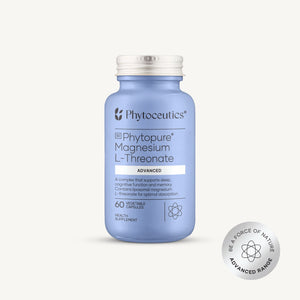Magnesium is a powerhouse mineral involved in hundreds of essential biological processes. It supports everything from better sleep and regular digestion to easing muscle cramps, promoting heart health, and calming anxiety. New research also suggests that magnesium plays a key role in brain function – helping to support memory, focus, and mood.
What Is Magnesium?
Magnesium is a chemical element [1] and the eighth most abundant element in the natural world. It’s used in hundreds of different biological processes, but is also easily depleted. Magnesium can be found in foods like leafy greens, nuts and seeds, avocados, bananas, as well as fatty fish like salmon and mackerel, and other foods.
Why Take A Magnesium Supplement?
If magnesium is present in so many food sources, why supplement? Despite its presence, it’s often difficult to take in enough magnesium-rich foods on a daily basis. Plus, if your body struggles to absorb this key mineral, it’s extra tough to get what you need from food alone.
Magnesium supplements [2] also come in a variety of types, each extracted and specialised to help with different things within your body. Taking magnesium supplements also ensures the magnesium is in high enough doses to be helpful, and it's often more bioavailable (that is, easy for your body to absorb and use) than in magnesium-rich food, which needs to be digested and transformed within your body.
What Does Magnesium Do?
Magnesium does so many things! For example, magnesium citrate is great for reducing constipation and relaxing muscles, magnesium oxide is a great antacid, and magnesium glycinate helps with calming and sleep support, and is quite gentle on the digestive system [3].
Magnesium L-threonate, in particular, is a specially formulated type of magnesium known to cross the blood-brain barrier effectively and help with brain health, memory, and cognition.
What’s The Connection Between Magnesium L-Threonate And The Brain?
Studies have shown that magnesium L-threonate improves plasticity in the brain, essentially keeping it young and able to create new neural pathways. Magnesium deficiencies have been linked to brain ageing, and research has shown that magnesium L-threonate can reverse cognitive impairment by as much as 9 to 14 years in magnesium-supplemented older adults [4].
Why is this so revolutionary? As we age, various vitamins and mineral levels in our bodies naturally decline; it’s part of the natural ageing process. But studies show that simply supplementing regularly with magnesium L-threonate can improve your brain’s ability to create and maintain new neural pathways, allowing you to learn new things, remember more, and think better even as you age [5].
How Does Magnesium L-Threonate Work In The Brain?
Magnesium ions control and block [8] the tiny electrical switches and intercellular connections [9] that regulate the structure and function of connections between cells. Magnesium L-threonate is especially important here, as it is specially formulated to cross directly into the bloodstream and then into the brain, unlike other forms of magnesium.
Lab studies [6] show that reduced magnesium levels correlate with increased neurodegenerative diseases. Raising magnesium levels [7] in the brain led to long-term positive effects in cognition, memory, and plasticity.
Why Is Magnesium L-Threonate Important For Ageing Brains?
In 2015, a study was published [10] that showed increased speed in executive functioning, improvements in working memory and in episodic memory, or the ability to remember things in the short term and connect memories from different times and events. This study, done on adults aged 50 to 70 with self-reported declines in these areas, showed that specifically, magnesium L-threonate was able to build up in the body and, over time, improve many areas of memory, concentration, and cognition [10].
How To Supplement With Magnesium L-Threonate Effectively
For effectively increasing magnesium levels, we recommend supplementing with Phytopure® Magnesium L-Threonate Advanced, taking 1-2 capsules daily with food to increase absorption. Magnesium can be taken at any time of day, but many people prefer to take it before bed, as magnesium L-threonate also has calming effects [11], improving sleep quality.
As we age, and as the global population lives longer, magnesium L-threonate has the potential to improve the lives of ageing adults, decreasing cognitive decline and increasing quality of life. It's unique ability to cross the blood-brain barrier and increase magnesium levels directly in the brain makes it especially promising for supporting the cognitive health of generations to come.
This content is for informational purposes only and does not constitute medical advice. Always consult with your healthcare provider before starting any new supplement, especially if you are pregnant, nursing, have a medical condition, or are taking prescription or chronic medication.







